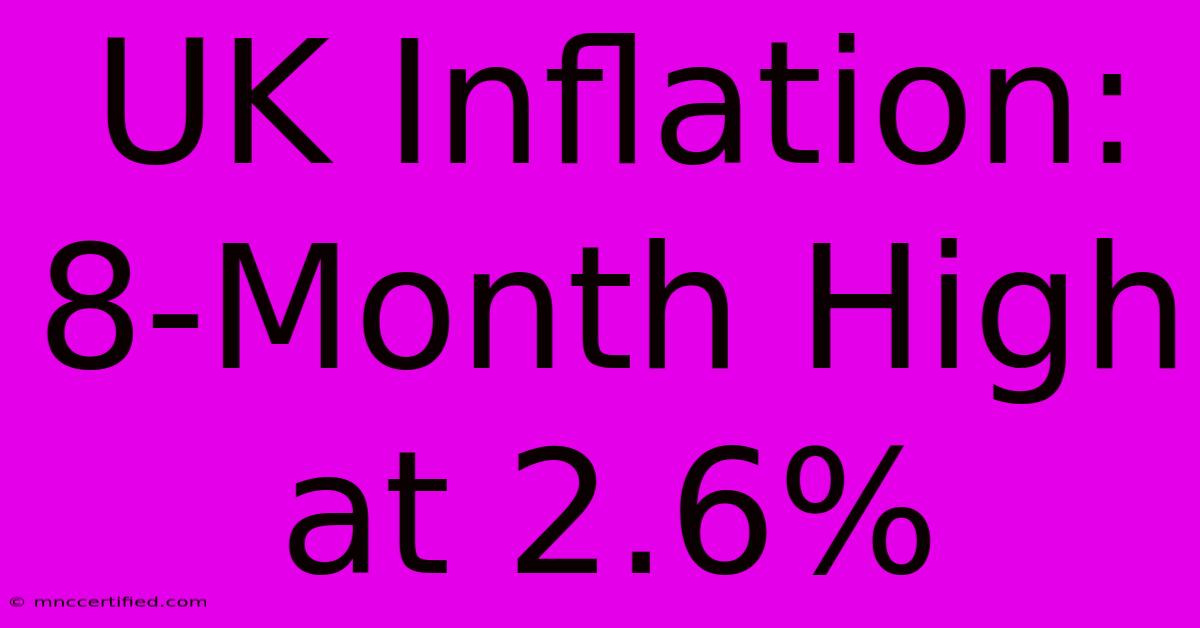UK Inflation: 8-Month High At 2.6%

Table of Contents
UK Inflation: 8-Month High at 2.6% – What Does it Mean for You?
The UK's inflation rate has climbed to a new eight-month high of 2.6%, according to the latest figures released by the Office for National Statistics (ONS). This increase, exceeding economists' predictions, has sparked concerns about the potential for further price rises and their impact on household budgets. This article will delve into the details of this latest inflation surge, exploring its causes, potential consequences, and what it means for the average UK citizen.
Understanding the 2.6% Inflation Figure
Inflation, simply put, is the rate at which the general level of prices for goods and services is rising, and subsequently, purchasing power is falling. A 2.6% inflation rate means that, on average, the cost of living has increased by 2.6% compared to the same period last year. This seemingly small percentage can have a significant impact on household finances, especially for those on fixed incomes or with limited disposable income.
Key Drivers Behind the Inflation Rise
Several factors contributed to this recent jump in the UK's inflation rate. These include:
- Rising Energy Prices: A significant contributor is the increase in global energy prices, impacting both household energy bills and the cost of transportation. The ongoing global energy crisis plays a significant role here.
- Supply Chain Disruptions: Lingering supply chain issues continue to constrain the availability of goods, driving up prices. This is particularly evident in certain sectors like manufacturing and food production.
- Increased Demand: As the UK economy recovers from the pandemic, increased consumer demand is putting upward pressure on prices. This demand-pull inflation is contributing to the overall rise.
- Brexit Impact: While the full extent of Brexit's impact on inflation is still debated, some economists argue that increased trade barriers and reduced access to the EU single market have contributed to rising prices for certain goods.
What This Means for Consumers
The 2.6% inflation figure directly translates to higher prices for everyday goods and services. This means:
- Increased Grocery Bills: Food prices are significantly impacted by inflation, leading to higher grocery bills for families across the UK.
- Higher Energy Costs: Energy bills are likely to continue rising, adding pressure to household budgets, especially during the colder months.
- Reduced Purchasing Power: With prices rising faster than wages, consumers are experiencing a decline in their purchasing power, meaning their money stretches less far than before.
The Bank of England's Response
The Bank of England (BoE) closely monitors inflation and uses monetary policy tools to control it. A potential response to rising inflation could include an increase in interest rates. While this can curb inflation by making borrowing more expensive, it can also stifle economic growth and impact consumer spending. The BoE will need to carefully balance these competing factors.
Looking Ahead: Future Inflation Predictions
Predicting future inflation is inherently complex, but several factors suggest potential future trends:
- Global Economic Conditions: Global events, such as geopolitical instability and further supply chain disruptions, will significantly influence UK inflation.
- Government Policy: Government interventions, such as energy price caps or targeted support for vulnerable households, can mitigate the impact of inflation.
- Wage Growth: The rate of wage growth will play a crucial role in determining the affordability of goods and services for consumers.
The rise in UK inflation to a 2.6% eight-month high is a significant development that demands careful attention. Understanding the factors driving this increase and its potential consequences is crucial for both policymakers and consumers alike. The coming months will be critical in observing how the BoE responds and how the inflation rate evolves. Staying informed about economic developments and adapting spending habits accordingly will be essential for navigating this period of economic uncertainty.

Thank you for visiting our website wich cover about UK Inflation: 8-Month High At 2.6%. We hope the information provided has been useful to you. Feel free to contact us if you have any questions or need further assistance. See you next time and dont miss to bookmark.
Featured Posts
-
Eddie Stobart Obituary And Life
Dec 19, 2024
-
Lawson To Replace Perez At Red Bull
Dec 19, 2024
-
Andrew And Tristan Tate 2 M Confiscated
Dec 19, 2024
-
Mega Millions Soars 825 M Up For Grabs
Dec 19, 2024
-
Rodman Estranged Relationship Revealed
Dec 19, 2024